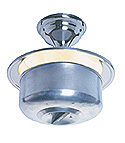 The Online Magazine about New York Designers |
|
|
The Duchamp of Dumpster Diving
DB: …That was YOU? (laughter) RT: I made you look at my portfolio! (laughter) DB: I WAS a little older than you and not so busy at the ICFF… (laughter) RT: Yeah. I was
very shy, and I was already thinking, "they're going to escort me out,
because I don't belong here." (laughter)
So, y'know there were all of these people, with all of this wonderful
inlaid wood, and glass, and I showed probably four or five people my
portfolio, during that first show. And they all asked me where my stuff
was. And, one particular person, the words he used were, "Where is your
stuff right now?" And I said, "Well, it's at my house." And he said,
"Get it out, get |
||
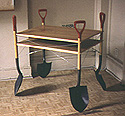 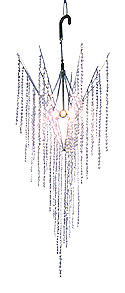 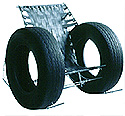
|
RT: …And I was dragging stuff in, and everybody else had dollies and crates… DB: …And staff! (laughter) RT: …And staff! And they're rolling carpeting out on the floor, and lighting and there's all of this polished metal, and I just remember being…horrified. That I went as far as this…to print stuff, to pay for this, to be here at all. I just remember, as I was setting up, I was trembling, and not talking to anybody, because I was horrified about my crap, my horrible, horrible, crap..! DB: But, how did the show go? RT: Well, there was a man from Seattle, and he was just looking for manufacturers, and all he had were these little mock-ups, that were so petite and polite and just BEAUTIFULLY executed, and they were sitting on top of these posts, and he had a double-sized booth. And, he was all finished; he basically unpacked four suitcases, and he was done. And he starts talking to me. And, I guess all I could think about was how horrified I was, so it came out. And he said to me, "First of all, you need to relax. Because your stuff is good. Your stuff is executed well. I would have no idea, if you hadn't told me, that you had painted and did finishes in your kitchen; It looks like it's professionally done." And, he said to me, "You need to walk around and look at everybody's stuff, because you need to realize that your stuff looks great, you've made it here to this show, and you need to relax." And, I was still a nervous wreck. But, again, by half-way through the first day, that horror had gone away. Because there were so many people who were saying, "Wow, wow, Terrific stuff." I kind of needed that to move forward. LG: That validation? RT: I kind of needed that. I guess it was the next step? I wasn't swimming yet…I was on the beach, doing my thing. But now, I'm getting into the water… DB: I think you were still in the cabana… (laughter) RT: Exactly! I kept putting more and more and more lotion on! You've got enough sunblock on you!!! Get out here! DB: And, when you did that first show…you didn't have a shop yet. RT: Right. I was working in my kitchen… LG: We're very interested in this kind of thing: how people who are starting out their businesses produce their work. And, how many of us started working in our homes, in the kitchen, or in the bathroom, or in the tub? RT: One big thing was that I had one of the most understanding
– I don't know if he was on some kind of product – roommate. Because,
he never complained once about the whole business. For that first ICFF,
being a graphic designer, I thought, "OK, we want to make sure that
we have enough printed materials," and I wanted the printed DB: So, they obviously became your dining room chairs. (laughter) RT: It's a good thing that I had
twelve foot ceilings, because they stacked up on one wall. I remember
the space around the dining table getting narrower and narrower…and
as I was building more, it was starting to get where I couldn't push
the furniture away, unless I stacked the furniture on top of itself…there
wasn't floor space. DB: What was the product? RT: The refrigerator door dressing mirrors; they wanted one per store. It's old refrigerator doors, stripped down to the metal. It hinges to the wall, and there's a dressing mirror inside. And they ordered these electric chairs. I haven't done any upholstery since that chair. That was a nightmare. The electric chair, was [designed] where the whole outside of the chair was exposed to the hardware. So, it was two of those electric chairs, and they also ordered one of my garden hose coffee tables.. DB: Those pieces for all fourteen stores were all produced in Pennsylvania? RT: Yeah, in my mom's garage. DB: I think that's one of the essentials to starting a business, is to have a mother with a garage. (laughter) LG: What constraints and freedoms in New York affect your work? Or, how do they affect your work? RT: I think that, in New York, originally, helped to give birth to my work… DB: …Because of your need for furniture? RT: Because of my need for furniture, the fact that I couldn't afford to buy what I had wanted, and then, the resources on the street. DB: I wanted to ask you about those resources, actually, because in our view, they've changed…A lot of the hardware stores aren't the same anymore, and even the dumpster diving has changed…have you experienced that, too? RT: Yeah. I was on almost a schedule…where I knew when items were being thrown out, and this and that, and because I tend to grab the stuff that nobody else wants, I still find treasures, but you know what, though? I don't find nearly the quantity…and I don't know why that is…because the resources HAVE changed a lot. DB: Do you find that you're stumbling across less of it now? RT: Yeah. DB: And I wonder why that is, too. You'd almost think that in this age of excess, there'd be more thrown out. RT: And, with all of this "nesting" stuff going on, and people buying more for their homes, you'd think that there would be even more stuff out there. LG: And, it might be the time period of the things, being thrown out, might not be as interesting? RT: Maybe. DB: And the fact that everything is considered "collectible" now. |
|
|
|
DB: I mean, I have an Eames aluminum chair, that was found on the street. That wouldn't happen anymore. LG: One of the questions we like to ask is: if you could change one aspect of working in New York, what would it be? RT: The biggest thing that I've been feeling lately,
that's really frustrating, is that, I know that I'm in a city, where
there's such excessive wealth, and it's revolting, and some of these
people that are revoltingly wealthy, actually are philanthropists. Or,
venture DB: …So close, and yet, so far. RT: Right. And it's that whole thing, "I'm right here, on that line." And I think, how do we connect with the people that could make this happen. How do I connect? Because I know that they are here. How do I find a rep? I know that business would be better for me, if I had a rep. I know it. Because I know that I'm really sloppy with follow-up, I know that I'm really sloppy with sending out things…it takes me a week or two. LG: You also have two careers. And that's the problem that a lot of designers get into. It's hard to follow up. |
|
|
|
RT: Right. And, that has been my biggest frustration. Because I know that the resources are here. It's like, you're starving to death, and you know that the resource of food is all around you. How do you make this happen? I know it's there. DB: Well, how would you change that? LG: In an absolute perfect world, you could have everyone wear name tags, with what they do… (laughter) DB: That's actually what the internet can do, in a way. It's not a New York thing. RT: Yeah, I don't know how you'd change that. You could slam down a couple of cocktails as soon as you get to an event… (laughter) But, how do you say…see, I've been to events where, I've had conversations with a couple of people, where I've thought to myself, "if I just say, ‘y'know, I'm really looking for a patron, or a venture capitalist,'" if somehow I could breach that ground and cross that line, then somehow they could quite possibly be someone who not only could be interested in laying out some cash, to see some things developed, but would also be great people to work with. Like, actually enjoy having people like us as partners. DB: But, you're also in the same room with these people who, if they're looking to invest, they are looking to invest in mega-companies, or dot-com ventures, not in small furniture businesses. RT: Well, but some of them are more like "patron" type people. LG: Well, that makes sense for your type of work, because it's furniture, but it's also really sculpture. It crosses the line between fine art and applied art. DB: The real question is, can you do your work elsewhere? RT: I think, at this point, that I could work elsewhere. Now that my work has gotten rolling, and now that my work has got an identity...when people call me, and ask me to a project, they know what they're going to get. They may throw a mix in, and say, "Do it all with hairbrushes," but they know what to expect. So, at this point, I think I could go elsewhere. But, I think ...that there is an energy [here] where you can create almost anything, where there will be a place for it. Because you go into restaurants, you go into galleries, all these different places, and there's something different, there's something new, people are trying…maybe it's done well, maybe it's not, but there's a place for something. And, that's inspiring. And it makes me feel like, "hey, yeah, keep making this weird stuff, ‘cause y'know, there's a place for it somewhere."
|
|
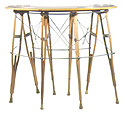
 it
out, get it out, get it out. Until you get it out of the house, you're
not going to know how the world out there is going to respond." And
so, that inspired me to think, "Well, I should do this ICFF thing, if
they'll have me." And I remember setting up that first year. And, as
I was setting up, I was horrified, that I was doing this show. Horrified.
Because I would see these big crates come in, and I was thinking, "oh,
my god, I wrapped my stuff with bubble wrap and masking tape…"
it
out, get it out, get it out. Until you get it out of the house, you're
not going to know how the world out there is going to respond." And
so, that inspired me to think, "Well, I should do this ICFF thing, if
they'll have me." And I remember setting up that first year. And, as
I was setting up, I was horrified, that I was doing this show. Horrified.
Because I would see these big crates come in, and I was thinking, "oh,
my god, I wrapped my stuff with bubble wrap and masking tape…" 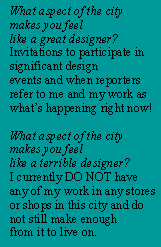 materials
to just be amazing. So, I over-estimated [promotional] stuff. I had,
I think, sixteen boxes… (gasps)
materials
to just be amazing. So, I over-estimated [promotional] stuff. I had,
I think, sixteen boxes… (gasps) 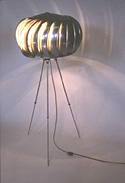
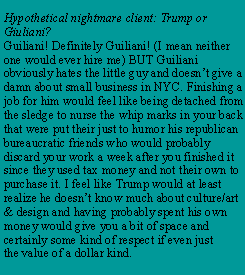 capitalists. And they're looking for people like me, that are maybe
saying, "I could see where you could make more money, but it might be
a little risky." And I probably walk past a dozen of these a day.
capitalists. And they're looking for people like me, that are maybe
saying, "I could see where you could make more money, but it might be
a little risky." And I probably walk past a dozen of these a day. 